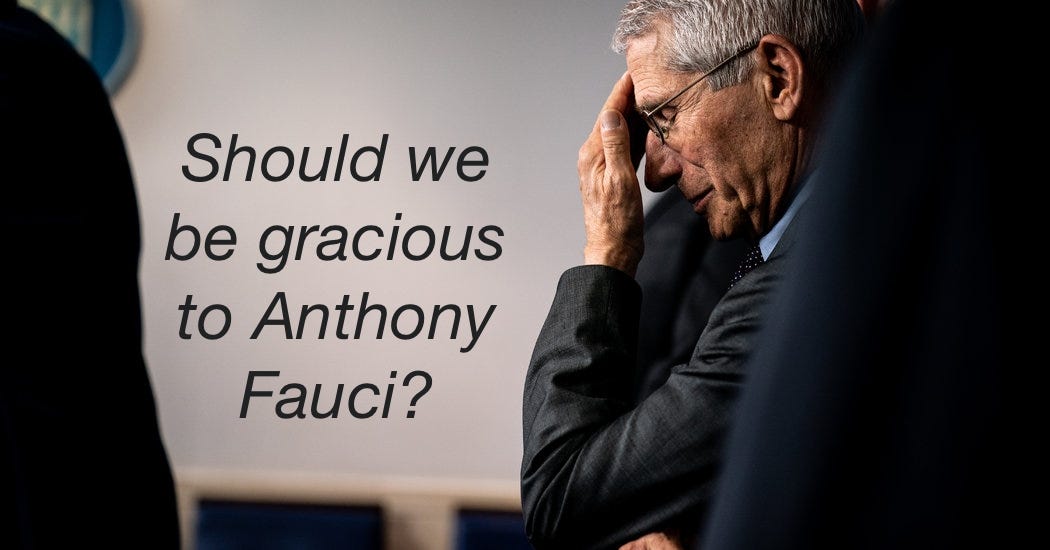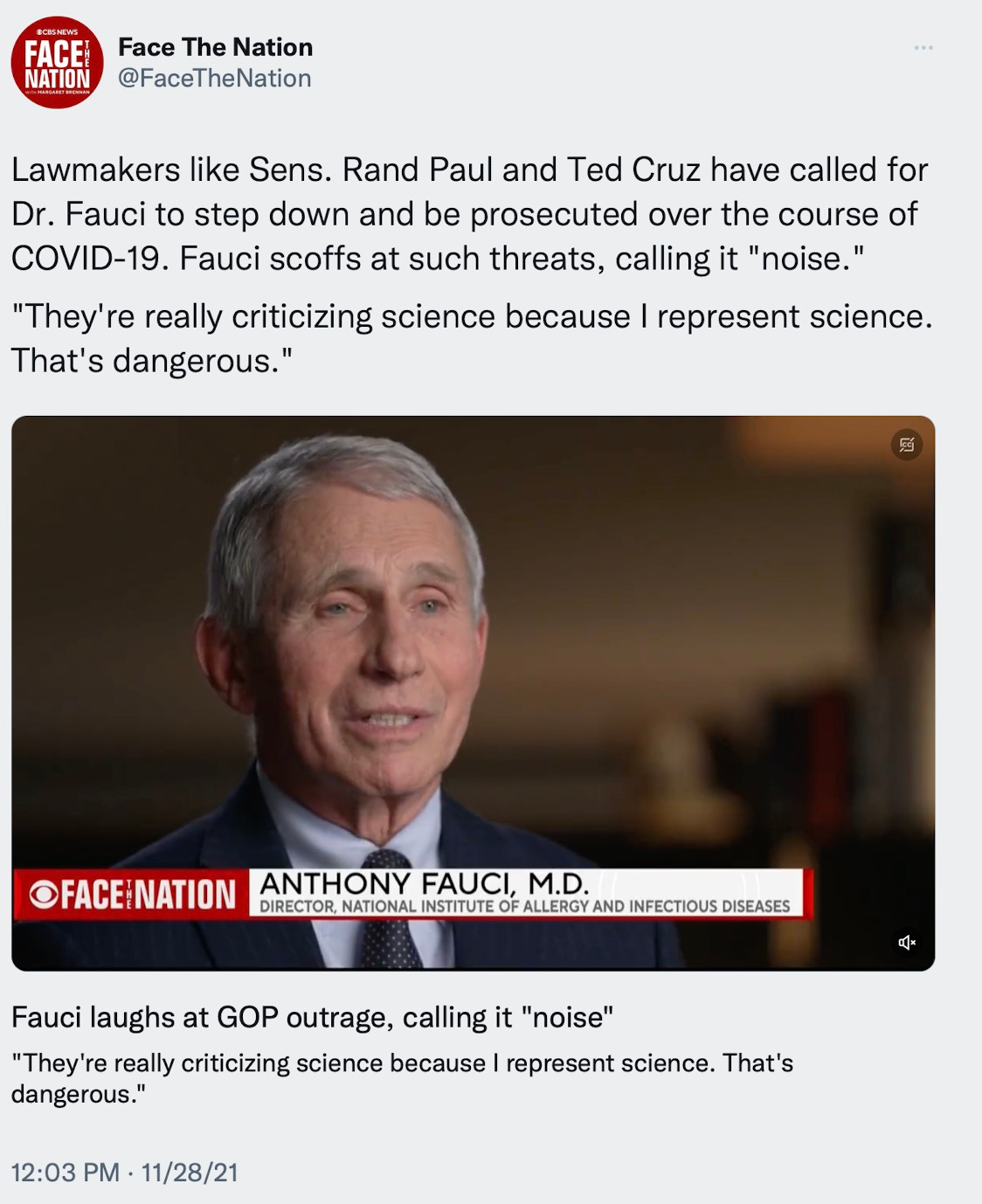Should we be gracious to Dr. Anthony Fauci?
I’ll admit at the outset I’m no fan of Dr. Fauci. To quote Shakespeare from Hamlet, “Something is rotten in the state of Denmark.” When he began appearing alongside President Trump in March 2020 as part of the COVID Taskforce, he seemed to enjoy himself. Over the next three years, it became clear that he clearly enjoyed the spotlight.
These days, Dr. Fauci will have more to answer for as Congress discovers what he knew when.1
Prior to Congressional hearings, as the nation’s highest-paid bureaucrat, Dr. Fauci was on talk shows, morning news programs and magazine covers. His enigmatic smile showed that he was enjoying himself. He reveled in adoration, it seemed. When presidential candidate RFK’s searing book The Real Anthony Fauci was released and soared to a best-seller, it became harder for others to unquestioningly adore him.
His prognostication of being the epitome of science during 2021 was the nail in the coffin of his credibility.
In an interview with Chuck Todd on MSNBC, Dr. Fauci said:
“It’s very dangerous, Chuck, because a lot of what you’re seeing as attacks on me quite frankly are attacks on science, because all of the things that I have spoken about consistently from the very beginning, have been fundamentally based on science.”2
Those who had followed his every opinion as a science gospel, were too far “in” to retreat. They continued to receive booster shots and wear masks long after the masses had sheepishly thrown out their face diapers and recognized that no matter the number of boosters, people still got COVID. In fact, those who had been vaccinated continued to get it more often than those who were unvaccinated.
In a surprising and refreshing candid admission, one medical school student wrote for Newsweek:
“I can see now that the scientific community from the CDC to the WHO to the FDA and their representatives, repeatedly overstated the evidence and misled the public about its own views and policies, including on natural vs. Artificial immunity, school closures and disease transmission, aerosol spread, mask mandates, and vaccine effectiveness and safety, especially among the young. All of these were scientific mistakes at the time, not in hindsight. Amazingly, some of these obfuscations continue to the present day.”3
Dr. Vinay Prasad posted a response to Dr. Fauci’s “I am the science claim” on the Brownstone Institute4 as well as a video:
The New York Times interviewed Dr. Fauci in April 2023.5 Kyle Becker wrote a masterful synopsis of the interview, highlighting some profound flip-flopping.6 Becker tries to explain how a wealthy, promoter of failed public health policy ascended to a stage of adulation.
He became to many liberal observers the "Science" of Covid-19, rather than a deeply conflicted public health official with a penchant for making contradictory statements and troubling ties to the Wuhan lab where the virus likely originated.7
Should we be gracious to Dr. Anthony Fauci?
Becker’s article is definitely worth reading - especially some of his concluding paragraphs, which I quote here.
Dr. Anthony Fauci was undoubtedly under a tremendous amount of pressure throughout the Covid pandemic. It was too large a task for any one person to handle, no matter how brilliant.
But that is precisely the problem: In a nation of three hundred million people, there are thousands of brilliant people that Americans can turn to in order to get personalized health advice.
It is the problem with central planning summarized aptly by F.A. Hayek in his Nobel Prize lecture as the "pretense of knowledge." Hayek criticizes the “scientistic” attitude – an attitude which “is decidedly unscientific in the true sense of the word, since it involves a mechanical and uncritical application of habits of thought to fields different from those in which they have been formed.”
This sums up the precise issue with asking scientists to formulate public policy. Their scientific attitudes on what constitutes rational policy tend towards unbending mandates that are inconsistent with a free society.
Although it is the inclination of many people who are threatened with the unknown to rely on "experts" and to adopt a "herd mentality," the strength of free nations like the United States has always been its ability to marshal resources across a broad and diverse population of millions of people. Through decentralized decision-making, scientists work together to discover the best solutions. They communicate the known science to elected officials who then implement policies that acknowledge constraints and trade-offs. They freely communicate the results of these policies to other elected officials who evaluate their suitability to local conditions.
The resulting "spontaneous order" reflects the communication of billions of variables in a complex network that cannot be known to any one "expert," no matter how brilliant he is. And the development of tools like the Internet and Artificial Intelligence has only increased the capability of local officials and individuals to respond to national emergencies such as the Covid pandemic.
Central planners like Dr. Anthony Fauci, however, are fighting a rear-guard battle to maintain authority in the face of vast technological changes that democratize knowledge and undermine their exalted positions. It is a reactionary fight that led to the advocation and implementation of authoritarian and ineffectual policies during the Covid pandemic.
The political division that resulted from the Covid pandemic response was inevitable. It will only get worse in future national emergencies until Americans realize the backwardness and futility of central planning in an extraordinarily complex world.8
Not only do Becker’s conclusions offer some profound thinking on the failure of “groupthink” in a world full of resourceful ingenuity, but they help us answer, “Should we be gracious to Dr. Anthony Fauci?”
We must ask the question of who is really to blame?
When we assess that the response to the pandemic was more catastrophic than the actual pandemic itself, it warrants accountability. We want justice. But who is to blame? Is it Dr. Fauci? Or is it ourselves? Are we all just mad that we got taken for a ride? That we were forced or coerced or guilted into getting a vaccine or closing our businesses or churches? Are we mad for getting canceled or deplatformed? And is Dr. Fauci the single human whom we can pour out our ire and wrath? Is he the one we all deem most responsible? Is it possible that he’s a selfish, preening, failed bureaucrat who is also a scapegoat?
Should we be gracious?
I want accountability and justice. From President Trump’s hasty rollout of vaccines to the closing of “unessential” businesses that led to their ultimate shuttering. People lost their dreams and livelihoods. I want justice and accountability for all those who lost loved ones and were unable to go to the hospitals to visit them in their final days or even go to funerals. I want justice for the epidemic of loneliness and depression and suicide. I want justice for the excess mortality we now see. I want justice for the three years of vilification and reviling I and others received for questioning a narrative that proved to be wrong.
And yet.
I also want grace for myself when I screw up. I want grace for myself when I make a series of extended bad decisions. I want grace for my loved ones and friends. I want grace in times when I have no foundation on which to stand and I am blameworthy.
I want grace.
And therefore… I must -we must - extend it. We can be gracious and pursue justice and accountability. We can be gracious and insistent on righteousness. We can be gracious and understand that there are still consequences for poor judgment, malicious behavior and corruption.
Extending grace does not nullify the pursuit of justice. That is exactly the lesson of the One who was crucified that we might receive grace. We want grace, and therefore we must extend it. As difficult as it is, the One who preached and practiced it to the extreme tells us so:
“For if you forgive others their offenses, your heavenly Father will forgive you as well. But if you don’t forgive others, your Father will not forgive your offenses.”9
“And whenever you stand praying, if you have anything against anyone, forgive him, so that your Father in heaven will also forgive you your wrongdoing.”10
When they arrived at the place called The Skull, they crucified him there, along with the criminals, one on the right and one on the left. Then Jesus said, “Father, forgive them, because they do not know what they are doing.”11
We have all been recipients of grace. We must extend it and pursue justice.12
House GOP investigate Fauci aide for using private email to avoid COVID origins scrutiny, by Gabrielle Etzel (Washington Examiner, June 29, 2023)
Fauci: Attacks on me are really also ‘attacks on science,’ by Peter Sullivan (The Hill: June 6, 2021)
He said it again in November 2021:
Anthony Fauci: I Am the Science, by Michael Brendan Dougherty (National Review: November 29, 2021)
It's Time for the Scientific Community to Admit We Were Wrong About COVID and It Cost Lives, by Kevin Bass (Newsweek: January 20, 2023)
The above op-ed is truly well-written and engaging. I encourage the read. I found Kyle Becker’s February article also a helpful “documentary:”
The Collapse of the State-Approved Covid Narrative, by Kyle Becker (Relentless, February 9, 2023)
Is Anthony Fauci the Same Thing as ‘Science’? by Dr. Vinay Prasad (Brownstone Institute: December 1, 2021)
Dr. Fauci Looks Back: ‘Something Clearly Went Wrong,’ by David Wallace-Wells (The New York Times: April 24, 2023)
The author of the NYT piece makes some astounding claims that have been thoroughly debunked, and yet he and other MSM outlets continue to propagate them (claiming masks work, ignoring natural immunity). In the interview, Dr. Fauci doesn’t contradict him, though he knows better.
Dr. Fauci Reverses Himself on Masks, Admits Something 'Clearly Went Wrong' with Covid Pandemic Response, by Kyle Becker (Relentless: April 26, 2023)
Ibid.
Matthew 6:14-15
Mark 11:25
Luke 23:33-34
The parable of the unforgiving servant in Matthew 18:21-25 is one of the hardest teachings of Jesus. It is always convicting to me. May we read, digest and practice its principles of being grace givers.




What a great article Jeff!
Sometimes even after grace is given there are still consequences to face from our bad behavior, right? If we have received the ultimate grace of Christ, our actions might not send us to hell, but they sure might send us to prison.
I have been granted undeserved grace more times than I can count. And often without the consequences I expected and deserved. I’m so grateful and I pray to extend grace.